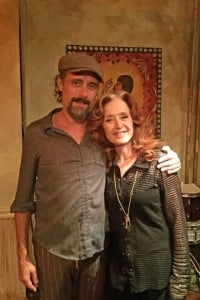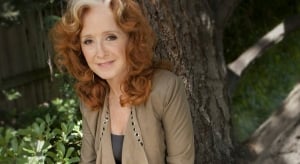

“I’ve never even been to Bed-Stuy before,” Bonnie Raitt said. She was at the deep end of Bar LunÀtico, which is owned by her friend Richard Julian, a singer and songwriter. A few years ago, Julian, amid the ongoing struggle of trying to make a living in the music business, decided to diversify, so he bought a building in Brooklyn, moved in upstairs with his wife and child, and turned the ground floor into a bar, with a stage crammed in one corner. Raitt was here to hang out, not to perform. She favors bigger venues, and has been successful and sensible enough in her affairs to have the luxury of forgoing diversification.
It was early evening, and there weren’t many people around. She had on black boots, black jeans, a faux-leather mesh shirt, and a necklace of brass skeleton keys. To go incognito, she’ll often not wear eye makeup and truss up her red hair under a hat, but on this night she felt no need to hide. She looked like Bonnie Raitt. She tasted her drink, a nonalcoholic craft cocktail, and said, “I might have to hit on myself later.”
“It’s really nice to be here and watch the daylight fade,” she said. On the road, she explained, she spends her late afternoons in windowless rooms and halls—sound check, dinner, prep, performance—and doesn’t get outside again until after midnight. “Small price to pay for the gig I have, but I really miss watching the day end and the night come on.”
When Raitt passes through New York, she tries to build in extra time. She likes to bike the loop around Central Park. She has tenuous roots here. Her early childhood was spent in Westchester County, while her father, John Raitt, held down the lead in “The Pajama Game” on Broadway. “I knew all the alternate parts of the shows he was in,” she said. “ ‘Carousel.’ ‘Oklahoma!’ It was really cool to hang out backstage when I was a kid and soak up all that warming up and all the half-naked people running around. He did twenty-five years of summer stock. He toured into his early eighties.”
When she was seven, he moved the family to Los Angeles. Summers, she attended a Quaker camp upstate. “I raced to get old enough to come to New York in the sixties, but I was too late.” It was in 1969, post-heyday, that she got her first real gig, at nineteen, at the Gaslight, in the Village. In the seventies, she often played the Schaefer Music Festival, at Wollman Rink; early sets led to late nights at J.P.’s, a notorious den on the Upper East Side.
Raitt got sober decades ago. “I needed to get healthy. Also, I was getting chunky, and I wanted to lose weight. Women at my end of the spectrum often blow up and then get into money problems and all that—whether it’s Judy Garland or Billie Holiday or any number of chanteuses who had no money at the end of their careers. I thought, You know, this is gonna get out of hand if I don’t do something. I was maybe going to work with Prince, and I thought, Man, if we make a video together, this is gonna look rough.”
She went on, “There’s always someone who can give you advice about stalkers or investing your money or not signing your publishing away. You know, ‘I’m in love with someone who’s married—what did you do?’ People help me, then I turn around and help somebody else. It sounds facile, but it’s what gets you through.”
A friend of Raitt’s walked up with an older guy, who had on worn dungarees and a black American-flag T-shirt and was carrying a guitar case.
“Know this cat?” the friend said. It was Danny Kalb, a bluesman from the old Village days, who was there to play a tip-jar set.
“Danny! Nice to see you.”
“Bonnie Raitt! Are you going to hear me tonight?”
“I’m gonna hear a little bit. I have to get up early tomorrow.”
Kalb went to set up, and Raitt said, “I haven’t seen him since the sixties. I only met him once.” She went on, “I feel really lucky at sixty-six to still have a gig, because there’s an awful lot of people who do this who aren’t suited for other kinds of work. What are they supposed to do, re-create themselves at sixty?”
Soon, Kalb began to play a low, muttering blues, accompanied by a younger man on standup bass. “Danny Kalb!” Raitt half whispered. “He was already famous when I was starting out. He’s much older than me.” She laughed. (He’s seventy-four.)
“Sing it high, sing it strong,” he grumbled into the mike. “Everything I’ve had is now done and gone.”
Later, between numbers, he said, “Tragedy. It’s kind of built into it, isn’t it, Bon?”
She nodded. Outside you could hear the rev of motorcycle engines. ♦
Source: © Copyright The New Yorker













 Visitors Today : 36
Visitors Today : 36 Now Online : 3
Now Online : 3















































































































